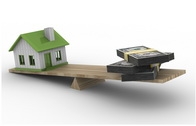Advertisement
FHA Answers Questions on Streamline Refinance Transaction Indemnification

The Federal Housing Administration (FHA) has posted new Frequently Asked Questions (FAQs) on its Streamline Refinance Transaction Indemnification, origination of a non credit-qualifying streamlined refinance of a loan originated by another lender ...
Question: Is the mortgagee that originates a non credit-qualifying streamlined refinance of a loan originated by another mortgagee liable for serious or material violations of U.S. Department of Housing & Urban Development (HUD) requirements or fraud or misrepresentation on the original loan?
Answer: No. The lender who originated a loan that involved fraud, misrepresentation, or any serious or material violation of HUD requirements is subject to an indemnification obligation and remains subject to such indemnification obligation despite an intervening non creditqualifying streamlined refinance. The lender originating the non-credit-qualifying streamlined refinance loan is liable only for its acts in originating the streamline and does not assume liability as a result of any action or omission in the original mortgage.
Question: If a mortgagee originates a non credit-qualifying streamline refinance of a loan that another mortgagee has already indemnified, which mortgagee is liable in the event of a claim on the streamline refinance that occurs during the indemnification period of the original loan?
Answer: Consistent with current practice, HUD will continue to require indemnification from the mortgagee that indemnified the original loan if a claim occurs during the indemnification period of the original loan. However, as noted above, if the origination of the non credit-qualifying streamlined refinance involved serious and material violations of HUD requirements or fraud or misrepresentation which resulted in a claim after the indemnification period on the original loan expired, HUD could request/demand indemnification on that streamline refinance loan from the non-credit-qualifying streamlined refinance mortgagee.
Question: If a mortgagee originates a non credit-qualifying streamlined refinance of a loan that another mortgagee has already indemnified, which mortgagee is liable in the event of a claim on the streamline refinance that occurs after the indemnification period of the original loan expires?
Answer: Because the indemnification period on the original loan has expired, HUD will require indemnification only from the non credit-qualifying streamlined refinance mortgagee if there were serious and material violations of HUD requirements or fraud or misrepresentation on the non-credit-qualifying streamlined refinance transaction. Origination of a credit-qualifying streamlined refinance of a loan originated by a another lender.
Question: If a mortgagee originates a credit-qualifying streamline refinance of a loan originated by another mortgagee, which mortgagee is liable in the event of a claim on the streamline refinance?
Answer: Because the credit-qualifying refinance results in the termination of the previous loan, the underwriting mortgagee on the new credit-qualifying streamline refinance is liable for indemnification on the streamline refinance mortgage.
About the author





